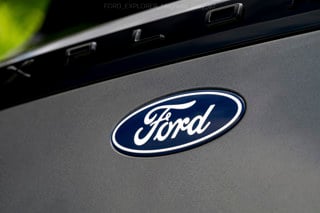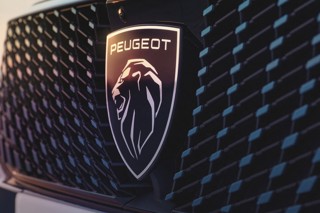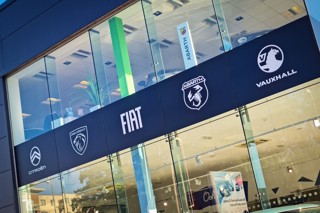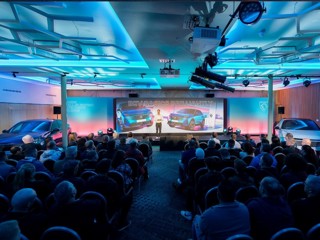Peugeot UK did just that in 2015 and it was duly hammered in the Winter 2016 NFDA Dealer Attitude Survey, rated third from bottom of the 28 brands involved for franchise value, with a score of 4.3 out of 10.
When David Peel stepped in as managing director in March 2016, it was clear to him that fixes were required. A motor retailer more than a distributor, he had spent the previous seven years as chief executive of Peugeot Citroën Retail Group, taking the manufacturer-owned group from a €25 million loss to a €10m profit.
When AM spoke to Peel in May, Peugeot had rebounded to seventh in the Winter 2017 NFDA survey (7.6), and dealer RoS was up to 0.8% – still below the industry’s average, but at least headed in the right direction.
 It doesn’t take a lot of common sense to predict that if a car manufacturer introduces a corporate identity upgrade in a year when its dealers’ average return on sales is just 0.6%, it will get a hard time.
It doesn’t take a lot of common sense to predict that if a car manufacturer introduces a corporate identity upgrade in a year when its dealers’ average return on sales is just 0.6%, it will get a hard time.
Peugeot UK did just that in 2015 and it was duly hammered in the Winter 2016 NFDA Dealer Attitude Survey, rated third from bottom of the 28 brands involved for franchise value, with a score of 4.3 out of 10.
When David Peel stepped in as managing director in March 2016, it was clear to him that fixes were required. A motor retailer more than a distributor, he had spent the previous seven years as chief executive of Peugeot Citroën Retail Group, taking the manufacturer-owned group from a €25 million loss to a €10m profit.
When AM spoke to Peel in May, Peugeot had rebounded to seventh in the Winter 2017 NFDA survey (7.6), and dealer RoS was up to 0.8% – still below the industry’s average, but at least headed in the right direction.
While dealer satisfaction has again dipped in the latest NFDA survey (5.2), Peugeot’s position on the franchise value question had again climbed relative to the other brands, finishing joint ninth from bottom (with Hyundai).
Under Peel’s leadership, the process for dealer targeting has changed, last-minute pre-registrations have reduced, one tenth of the network has been terminated and Peugeot has cut back on short-termist tactical registrations, such as in the rental channel, that hurt residual values and the competitiveness of its PCPs.
Peugeot’s overall position in the latest NFDA survey dropped to 18th. The carmaker said this was “particularly disappointing” but blamed it on the terminations and the deadline for its new CI, adding that it doesn’t believe it’s a true reflection of Peugeot’s engagement with franchisees. “These factors combined have created a 12-month period of intense pressure on the Peugeot franchised network,” it said.
Peel was unapologetic about the changes: “We’re talking the language of the network. It’s not about being nice, but being fair and transparent and taking the approach that ‘simple sells’.
“Our industry is very good at over-complicating what we do, and, from my experience, I know that if you keep things simple, dealers will embrace it better,” he said.
The brand’s ambition is to be the best “high-end generalist” in 2020, so its emphasis is on residual value (RV) protection and profitable business that is not damaging for the future.
One example was the launch of the new 3008 in the spring. The carmaker wanted to avoid dealers ordering demonstrators of its high-demand SUV in similar specification and colour, and then selling them all off simultaneously six months later and depressing the market price. Peugeot ordered a mixture and allocated
demonstrators to dealers on a contract hire basis, ensuring that it has retained control of how they will be remarketed.
Looking to a future with less volume
The future is a recurrent theme for Peel, who said he wants to remain in the role for at least five years “so there is consistency”. He believes the brand has suffered from a lack of consistency in its recent past, which has not been helped by having four chiefs (Peel, Tim Zimmerman, Stephan Le Guevel, and Neil Moscrop) in eight years.
Peel takes pride in his communication with the network. He hosts regular forums and expects dealers to speak their mind, and afterwards he writes back to the network with details of the key points for action. Many of those were points of severe criticism in the previous NFDA survey.
“This year, predicting the market has been more challenging than ever. We all knew Q1 was going to be strong because of the VED changes, so we wrote our plans to be strong in Q1.
“But we wrote a budget this year to do less volume. That said, our plans are written to increase retail sales by 5% in a retail market that’s predicted to be down 5% or 6%. Our loss of volume is in tactical fleet and pre-registration. Last year we did 6,000 less than the previous year, and that was tactical.”
Peel added: “Of course we’re focused on volume. We don’t have a plan to reduce our volumes significantly. But we have acceptance from Paris (Peugeot’s headquarters) that the reduction in volume is putting in the foundation for tomorrow. One of the advantages I have got is that in my last four years running the retail group, my boss in Paris was Jean-Philippe Imparato, who is now the chief executive for the Peugeot brand worldwide, so he’s as close as you could call a friend in business.
“It’s quite unusual for a Brit to have strong trust from Paris, but that’s the benefit I’ve got and that’s why we’ve seen the reduction in volume being accepted and understood.”
[gallery id=1476]
That decline in volume is evident from SMMT statistics. Peugeot’s new car registrations were down 8.4% in Q1, compared with a year earlier, and the decline had deepened to 13.2% halfway through 2017. In the eight months to the end of August, Peugeot registrations, at just more than 55,000, were down 15.2% year-on-year, in an overall market that was down 2.4%. However, its LCVs were up 13.4%, to 23,013, over the same period.
The brand is predicting a total industry volume (TIV), including LCVs, of about 2.9m to 3m, which would be down about 3%-4% on 2016. Its ambition is to take a 4.4% share of TIV, which breaks down to a 3.6% share of the new car market (2016: 3.6%) and 8.5% in LCV (2016: 8.8%).
Product problems and protecting RVs
Those falling car registrations are unlikely to be helped by allegations that Peugeot’s parent, PSA Peugeot Citroën, installed emissions-cheating ‘defeat devices’ in its diesel cars.
Similar to the Volkswagen ‘dieselgate’ scandal, an investigation by the French consumer and fraud watchdog claims that PSA installed suspect software in 1.9m vehicles. If found guilty, PSA could face fines of up to €5 billion. PSA denied the allegations, saying it “complies with regulations in every country where it operates”.
The brand also faces a challenge on product. The 208, its most popular model, is still two years from replacement while direct competitors such as the Ford Fiesta are fresher, and the larger 308 has never enjoyed the success in the UK that it has had on mainland Europe.
However, SUVs are helping. Demand for the 3008 is high, helped by PCPs underpinned by a guaranteed future value (GFV) some 20 percentage points stronger than the previous model’s. The facelift on the 2008 has been well received and a seven-seat SUV, the 5008, takes Peugeot into a new segment when it arrives in October (the old 5008 was an MPV).
Peel said: “Where we’re going to find challenges over the next two years is getting the conquest customer, when there is newer product on the market to take from 208. With our loyal customer base, we’re very good at making sure we renew them into 208.”
In the past, he said Peugeot tended to push tactical actions and packs of the 208 during the final week of the month. The dealer network was flooded with the same car, in the same spec, at the same time and RVs suffered as a consequence.
However, since he took over, Peel has operated an ‘always-on’ pack programme, which has terms on every model range for the whole of the month. The result has been a reduction to an average of 20 pre-registrations per dealer per year, and it is a mix of products.
As part of his focus on restoring
franchisees’ faith in the national sales company, Peel introduced the slogan “we’re stronger together”, and said everything being done is to ensure that it benefits both the network and Peugeot.
“My view is that we have to have a network that can generate 1.5% RoS to be sustainable for the future, sustainable in a way that investors remain engaged with us and have enough return to be able to re-invest in the brand. So 1.5% RoS is a key priority for us this year.
“At our business conference with the dealers in January, for the first time ever we said that our first priority is dealer profitability, not market share, not volume.”
According to Peel, improving profitability means putting more volume through fewer dealers. Peugeot has worked with Experian on a new network plan based on an expected 6% share by 2020 and 1.5% RoS. That network would be 185 locations rather than the 211 it has currently. That led to two-year termination notices being served on 22 dealers in Q4 2016, to reduce the network by the end of 2018.
“We’ll have the right number of outlets to give us the market share, but with a scale to the business that works for both the investor and for us,” he said.
In addition, seven dealers have been terminated on the basis of poor performance. Traditionally, a quarter of Peugeot’s network has lost money, said Peel. In 2015, only 50% of the network were achieving their sales targets.
Getting tough on CI upgrades
At the start of 2016, three quarters of the Peugeot network was not compliant with its latest corporate identity refurbishment, which entails the latest Blue Box exterior and interior. Peel has issued an ultimatum to the network – on January 1, 2018, non-compliant dealers will be terminated.
“It’s never been done before. We’ve been traditionally quite soft in not implementing a rule robustly,” he said.
The latest CI was introduced two years ago, with 2% margin attached for dealers who had it. Peel said Peugeot relaxed its rules, and paid the margin anyway to support dealer profitability. That attitude has ended.
“This is a very important year for the brand, because every investor has to make a decision whether to invest £150,000, knowing if they don’t there is now a definitive deadline. We expect 95% to do so.
“We are being a lot more robust and professional in the way we are operating. Fair, open and transparent, but demanding as well.”
When Peel took over, 80% of Peugeot’s own used cars were sold through 30% of the network. He wanted to address two issues – a large portion of dealers were not taking cars from Peugeot and it was selling 20% of its cars to independents, which meant they could compete with the network.
He has spent a year telling every dealer in the network that it needs to participate in Peugeot’s used car programme.
“My ambition is that, this year, we get to the point where we do not need to sell a used car outside the network,” said Peel.
The brand is working on establishing a national ‘Peugeot Direct’ programme, similar to the Ford Direct initiative. This would give consumers guaranteed quality, warranties and other enhancements, with Peugeot controlling the marketing and pricing of stock in the programme.
Peel said its aim is to influence the market price of used Peugeots, by advertising those cars potentially £200 to £300 higher than the current market price.
“The quality has to match the perceived value. This isn’t just a used car, it’s a manufacturer used car, which most people would naturally expect to be higher quality.”
A customer seeing a Peugeot Direct car online would contact their local dealer, that dealer would buy the car immediately from Peugeot through an internal system, and sell it to the customer.
Up to the sale, Peugeot retains the risk, so there would be no stocking costs for the dealer. The programme would be for a maximum of 25% of Peugeot’s own used car volume, from captive fleet and rental buy-backs, which tends to be about 2,000 cars a month.
“Today, whereas all the internet search engines are driving price down, we will try to progressively influence the price moving forward,” said Peel.
“Our online platform proves that people do pay more for the confidence of buying direct. So many people don’t like the haggling that they would be happy to pay a few hundred pounds more to avoid that situation.”
Order Online by Peugeot launched in February, and is achieving an average one or two new car orders daily. Among its key findings are that consumers will confidently transact online for a £30,000 car such as a 3008, and that they add an average three or four options, more than in face-to-face showroom transactions.
In April, Peugeot funded a two-week marketing campaign for used cars, with a £500,000 investment which included deposit contributions for consumers and radio and print marketing. Peel said Peugeot understands the need to assist dealer profitability after the plate-change month, so such campaigns help the network push out their used cars quickly and support cashflow.
Engaging dealers in selling LCVs
Another change Peel is driving has followed the realisation that barely a third of the network is regularly engaged in LCV sales.
“My commitment to the network is that we will be profitable and we won’t have loss-making dealers, but I’m not prepared to talk to you unless you’re participating in every channel.”
Since Peel’s appointment, Peugeot has worked on engaging every dealer to sell LCVs. “It’s like having a sweet shop and only offering half the sweets,” said Peel.
All franchisees are able to sell LCVs. In addition, about 70 franchisees belong to a dedicated business centre network.
Peel said the Peugeot Professional vans within its LCV range are ideal for smaller dealers to present, because they target independent traders in need of a ready-to-run vehicle.
The focus has led to some success: from only 25% of dealers selling LCVs when Peel took over as managing director, in Q1 2017 91% of the network sold at least one van.
Areas of influence
The dealer targeting process has changed, as part of Peugeot’s work with Experian. It identified that 50% of Peugeot sales came from within 16 minutes drive-time of a sales point on average, and 80% came from within 30 minutes drive-time. On that basis, Peugeot developed an ideal network plan.
Having decided which 185 dealers were in the plan, it mapped a 16-minute drive time from their centre, which was the ‘area of influence’, and the 30-minute drive time, which is their ‘area of opportunity’. Targets are now set every four months rather than monthly, and on the basis of the area of influence.
Peugeot asks for a 9% generalist market share (it excludes premium brands) from every dealer within their area of influence. Currently, 80% of the network is achieving target, said Peel.
Login to continue reading
Or register with AM-online to keep up to date with the latest UK automotive retail industry news and insight.





















Login to comment
Comments
No comments have been made yet.